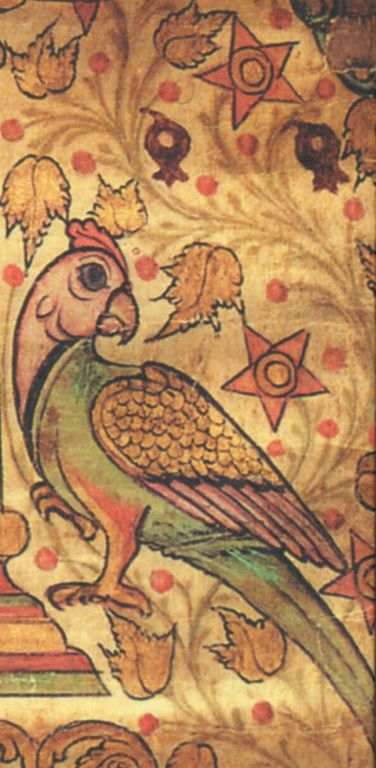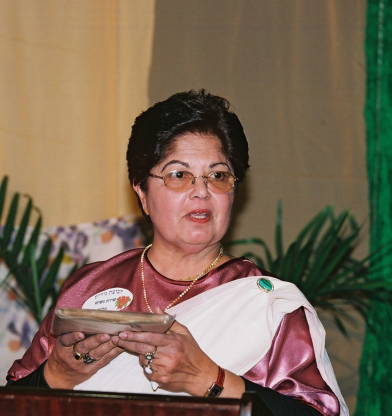2002/ 1977
44. Joseph the Righteous
44a. Venus Lane (solo), Rahel Kala, Simcha Yosef. Recorded at NSA studio, June 9, 2002. CD Track 19; III-30.
44b. Chana Eliyahu. Recorded by Edith Gerson-Kiwi and Shirley Isenberg, Moshav Mesilat Zion, 1977. Y55.
Swapna nimittaṃ dukkicce, yosephĕ
Swapna nimittaṃ stuticce, yosephĕ
1. Because of a dream, you were sad, Yosephĕ.
Because of a dream, you were praised, Yosephĕ.
Ha, ha, it’s cheerful to hear that, Yosephĕ!
Among the stars, you rose so high, Yosephě.2. This old man is just about to die, Yosephĕ.
Before you, am I not the moon, Yosephĕ?
Ha, ha, it’s cheerful to hear that, Yosephĕ!
Among the stars, you rose so high, Yosephĕ.3. In anger you caught hold of the star, didn’t you?
Abandoning the garment saved your virtue, didn’t it?
Ha, ha, it’s cheerful to hear that, Yosephĕ!
Among the stars, you rose so high, Yosephĕ.
Taṃbirān muyiṃbu toņayāyirikkeņaṃ
Tanda tuņayālě irrikkunna nerattu
Yākkobābīnuṃ śěbāttiṃ pandṟaņḍuṃ
Iṃbamāya toṟāyil neṟāyi vannūtě
4. May Tamburan the Lord be our first help.
At the time this happened, it was with His help.
Yaakob Abinu and the twelve tribes—
In beloved Torah and justice they dwelled.5. Father Vava’s orders were obeyed by the ten.
Together they went out, herding the goats.
As they were living in this way,
Vava’s request was obeyed by Yoseph.6. Through love of his brothers Yoseph went there.
In anger the brothers did a dreadful deed.
The men who bought Yoseph inflicted pain.
Yoseph fell pleading in tears at their feet.7. Beaten, falling, rolling, screaming he fled.
Ayyayyo! How it hurts to sing this grief!
When beautiful Yoseph was fleeing in fear,
He saw Mother’s grave, and there he fell.8. Yoseph poured out his inmost grief:
“O Mother, Umma, I have no one!
What shall I do? Who’ll be my guide?
Oh, to see Vava and study Torah!9. O Mother, who can bring this about?
Oh, wake up, Umma, and look at me.
Please comfort Vava in his grief.
Gently tell him what has occurred.
My brothers have done such a thing to me!
Has some unknown sin fallen on me?”10. Ayyayyo, it’s impossible to bear!
But one must not question the justice of God.
One must trust in the plans of Almighty God.
The evildoer will be revealed.11. “Yoseph, my son, I can’t bear this grief!
The tears you are weeping make me melt.
But Almighty God will rescue you.
Have hope, my son, for a future of joy.”12. Seeing this, his masters tortured him more.
They thrashed him more to force him to walk.
However he pleaded, no mercy was shown.
But they suffered torment in darkness too.13. In Egypt he was purchased by Potiphar,
Who put him in charge of household affairs.
With honesty Yoseph managed it all.
His master cherished him. All was well.14. But the mistress of the house was filled with lust:
“O beautiful Yoseph, fulfill my desire!”
“Oh no! How can I do such a thing?!”
For refusing her, he was thrown into jail.15. And how he suffered torment there!
O God, don’t inflict such calamity.
Ayyayyo, must I sing this terrible thing?
Deliver me, God, from my suffering!16. Eventually, King Pharaoh saw a dream.
Its inner meaning he could not discern.
The beautiful man interpreted the dream.
The world declared, “Yoseph is Egypt’s King!”17. Due to dreadful famine, the tribes came there.
Seeing Egypt’s king, they got quite a shock.
Seeing two boys who looked just like Yoseph,
They saw it was Yoseph who had these sons.18. The twelve tribes then assembled there.
All came together in great happiness.
The cities of Egypt shook with joy.
Celebrations were made by King Pharaoh.19. Beautiful Yoseph then spoke to them:
“Don’t doubt my words. This you must do.
Inform my Vava; bring him back with you.”
To welcome his Vava he sent many gifts.20. The ten tribes assembled together there.
And Seraḥ Bat Asher accompanied them.
While Yaakob still sat in mourning there,
The sweet little girl sang sweetly to him:
Āyissoḍě yosephu misṟīluņḍu
Ěphaṟāyuṃ měnāśěyuṃ kūḍěyuņḍu
Swapna nimittaṃ stuticciṭṭuņḍu
Āyissoḍĕ yosephu misṟīluņḍu
21. “Yoseph is alive and well; in Egypt he’s alive!
Menasseh and Ephraim are living there with him.
Torah they have mastered to a high degree.
Yoseph is alive and well; he has become a King!”22. “Yoseph is alive and well; in Egypt he’s alive!
All of the other Kings are under his rule.
Now the dream has been fulfilled and Yoseph got the praise.
Yoseph is alive and well; in Egypt he’s alive!”23. “Yoseph is alive and well; in Egypt he’s alive!
Twelve flags are standing there, standing in a line.
To receive the father, they are going now.
Yoseph is alive and well; in Egypt he’s alive!24. All of the twelve tribes are assembled there
To receive the father, waiting in a line!
The bullock cart was sent—was sent there as a sign.
Yoseph is alive and well; in Egypt he’s alive!25. Yoseph is alive and well; in Egypt he’s alive!
All of this gladness has been shown to you.
Who has got this kind of luck? No one but you!
Yoseph is alive and well; in Egypt he’s alive!26. When Yaakob was coming, together with the tribes
Yoseph saw them coming; he saw them on their way.
As great as the happiness that You showed to them,
O God, please grant such joy to us; bless us, God, we pray!
This lively and engaging narrative song about Joseph is a composite of oral and written variants. The entire song was sung from memory without hesitation by Chana Eliyahu, who was born about 1915 in Mala and made aliyah in 1954. When her performance was recorded in 1977 in Moshav Mesillat Zion by Edith Gerson-Kiwi and Shirley Isenberg, she told them that her family song notebook had been lost in a house fire there—a major loss for posterity as well as for Chana, as no song notebook from Mala has yet been found for the archive. The only other available version of part I (stanzas 1–3) is a fragment sung for me the same year by Chana’s sister, Leah Elias, who had married in Ernakulam and remained with her family there. Textual versions of parts II (stanzas 4–20) and III (stanzas 21–26) are found in notebooks from Parur, Chendamangalam and Ernakulam, but none in notebooks from Kochi. In preparing her solo rendition for the Oh! Lovely Parrot CD, Venus Lane learned the song by listening to Chana Eliyahu’s 1977 recording. All three recordings are preserved in the National Sound Archive.
Taken as a whole, “Joseph the Righteous” exhibits many elements of Kerala folk drama through the use of distinct and memorable tunes and dramatic “scenes” featuring colloquial conversation between characters (e.g. Joseph and his mother, and Joseph and Potiphar’s wife). It also makes use of direct address by the narrator: first speaking to Joseph in the preface; then addressing the audience in stanzas 7, 11, and 15 with the exclamation “Ayyayyo,” lamenting that this story is so painful to relate; and finally appealing to God in the final stanza of part III, pleading that all assembled should be granted happiness like that of Joseph and his family. The personal voice of the narrator initially draws the audience into the action by signaling a light tone at the beginning of the song. Later this voice creates a space for the singers as well as listeners to feel their own sorrow about Joseph’s sufferings and joy at his triumph, as demonstrated in Venus Lane’s heartfelt performance of the song.
Part I
Sung to the same melody as song 1 (“Oh, Lovely Parrot”), these three preliminary verses set out the themes of two biblical stories that were well known to the singers: first Joseph’s dream of the sun, moon, and stars (interpreted as his father, mother, and brothers) bowing down to him (Genesis 37:8–10), and then his betrayal by Potiphar’s wife, who snatched and kept his lower garment (Genesis 39:12). Zacharia (2001, personal communication) noted the dramatic and humorous “change of register” in the second stanza, which is decidedly more colloquial than the formal style of the other lines. The first two lines of the stanza can be taken either as quotes from the father and mother[1] or as an aside by the narrator, pointing first to the father and then the mother. In either case, the reference to the patriarch Jacob is less than respectful, especially in contrast to the tone of the main narrative of part II, which is filled with reverence for Joseph’s “Vava” (father).
Part II
Sung much more solemnly to a melody used in Kerala for the Hebrew bakashah “’Adon ‘Olam” (’Areshet 1980, 222), this section of the song touches briefly on highlights in the well-known story of Joseph, from his being sold by his ten brothers and taken to Egypt through his rise to power in Egypt and reunion with his brothers and father there (Genesis 37–45). In addition to mentioning the incident with Potiphar’s wife, the greatest dramatic emphasis is found in stories with two other female characters: first Joseph’s visit to the grave of his mother Rachel and then young Seraḥ Bat Asher’s revelation to her grandfather Jacob that Joseph was still alive. Both stories are from midrash Sefer ha-Yashar (Browne 1876).[2]
Part III
The lively part III is a popular, melodic, and imaginative account of the song that Seraḥ Bat Asher sang to Jacob, followed by stanzas that combine lines from written and oral versions to describe his joyful journey to behold his son in Egypt. Contrasting references to the “ten tribes” and “twelve tribes” in the final stanzas of the song (beginning with stanza 17) can be seen as a play on the comings and goings of Jacob’s sons and the later incorporation of his grandsons to make up the biblical twelve tribes.
The repeated line “Yoseph is alive and well” (Āyissōḍĕ Yoseph) has been used playfully by Kerala Jews to refer to any absent member of the community, substituting the person’s name and location in reciting the line. The Malayalam Jewish word āyissōḍĕ (derived from the term for “long life”) signifies living in a state of good health and well-being and is also used by Kerala Jews in formulaic blessings for various occasions.
“Joseph the Righteous” was popular as a wedding song in Jewish communities outside Kochi, to be sung on the final Shabbat of the marriage festivities (Walerstein-Sibony 1987, 113). It is just one of thirteen songs or song fragments about Joseph in the indexed corpus of song texts. Most of the others are part of a group of very old Malayalam Jewish songs also associated with the wedding cycle, the kāṇavvĕ songs analyzed in depth by Gamliel (2009, chap. 4). She suggests that Joseph may be such an important character in wedding-related songs because “certain aspects of his story enable both men and women to feel for him and identify with him” during this period of transition, when they, too, are “in an inner turmoil of excitement and apprehension about the unknown destiny ahead, both in the social and in the personal sense” (2009, 314). Certainly, Joseph’s inner turmoil is a featured element in this song “Joseph the Righteous.”
___________________________________
[1] See Gamliel’s Hebrew translation (Zacharia & Gamliel 2005, 62).
[2] Vayeshev 8, 9 and Vayigash.






